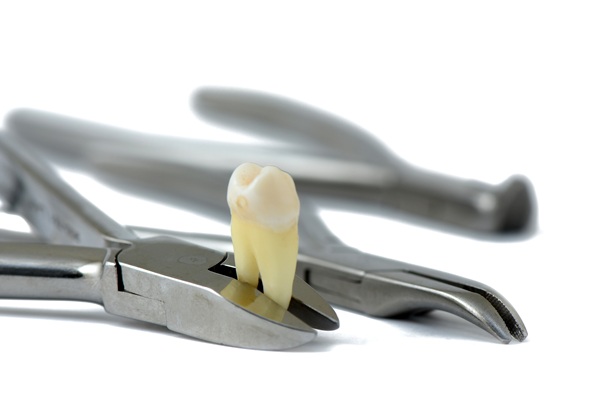What To Expect During a Tooth Extraction

The process of tooth extraction involves removing a tooth from the mouth by either surgically removing it from the gums or pulling it out using forceps. People may need a tooth pulled if it is affected by severe tooth decay or the surrounding tissues are infected from gum disease. Trauma to the mouth or overcrowding are other common reasons a simple extraction might be necessary. Impacted teeth, including wisdom teeth, can be removed from the mouth using surgery. Depending on what procedure is necessary, this is what you can expect when having a tooth extracted.
Preparing for a tooth extraction
Before removing a tooth, the dentist or oral surgeon will typically take an X-ray of the area, which can include a panoramic X-ray if getting wisdom teeth removed. The dentist can discuss the patient’s medical history and inquire about any conditions that can interfere with the procedure. Depending on the situation, the patient may be given antibiotics before surgery.
Patients should be given instructions such as details on what to wear on the day of the procedure and information on how long before to limit food and water intake. Driving arrangements should need to be made ahead of time if necessary, as a patient may not be able to drive immediately following the procedure. It is important for the individual to refrain from smoking the day before surgery to avoid developing dry sockets.
The procedure
What patients can expect for the actual tooth extraction procedure depends on if a simple or surgical extraction is required. For a simple extraction, the patient will be given a local anesthetic to numb the area surrounding the tooth. The dentist will loosen the tooth using a tool called an elevator and remove it from a mouth with forceps.
For a surgical extraction, the patient may be given anesthesia or other medications to relax the patient and numb the area. The gums are cut open to remove the tooth, which may require breaking it into pieces, and then the gums are stitched closed.
Recovery
The recovery period and level of pain experienced following tooth extraction are typically more severe for a surgical extraction than a simple extraction. It often takes a couple of days to fully recover from the removal. Ice packs can be used to reduce swelling and the dentist or surgeon will likely prescribe painkillers. Gauze is applied to the site to help the blood clot. Patients will need to avoid using straws and eat a soft diet for a day or more until the site heals. While patients can expect some discomfort following a tooth extraction, excessive pain or swelling can indicate an infection and should be looked at immediately.
Conclusion
Often, removing teeth is used as a last resort in situations where other solutions, such a root canal or orthodontic treatment, are not possible. It is important that patients are open with dentists when discussing their medical history to explore possible risks involved in having teeth removed.
Request an appointment here: https://brighton.pvoralsurgery.com or call Platte Valley Oral Surgery at (303) 997-0223 for an appointment in our Brighton office.
Check out what others are saying about our services on Yelp: Read our Yelp reviews.
Recent Posts
Wisdom teeth extractions are common procedures performed by an oral surgeon to prevent or address crowding, infection, and other complications associated with third molars. While the extraction itself is straightforward, proper care during the healing period supports a smooth recovery. With a few tips, patients can quickly recover from wisdom teeth extractions and avoid unnecessary…
Undergoing oral surgery can feel overwhelming, but proper post-operative care is crucial to ensure a smooth recovery. Whether you have had wisdom teeth removed, dental implants placed, or another procedure, following the right recovery steps can help minimize discomfort and prevent complications.First and foremost, the oral surgeon will provide detailed post-operative care instructions specific to…
Bone grafting is a surgical procedure that is done to rebuild bone loss or repair bone damage in the oral cavity. When a tooth is lost or removed from its socket, the alveolar bone supporting it starts to deteriorate, resulting in a gradual collapse of facial features. If this happens, a patient who opts for…
The TMJ, or the temporomandibular joint, connects the skull and lower jaw and is located by the ear. The joint functions like a hinge, enabling the jaw's movement for opening, closing, smiling, eating, and other mouth activities. If the jaw joint feels painful and is unable to perform its function, the cause could be what…


